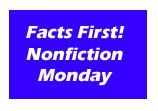I've never been much of a fan of spy/mystery stories. I don't have anything against them, it's just that in the huge number of stories that are published every year, other things pique my interest first. Janeczko says in his introduction that he guesses the reader of the book has an interest in spies that "may run as deeply as [his]." Well that's not the case for me, but I still found this to be an incredibly interesting book.

Janeczko definitely has a flair for drama, as often these are tales of agents or governments crossing and double-crossing each other. For example, in the case of the Berlin tunnel, just when you think the story has ended and all is well for the US...Janeczko reveals a major twist in the story, illustrating that even the best laid plans can go awry, and sometimes you won't even know it.
I also have to say I'm really impressed that Janeczko highlights female spies, without ghettoizing them into a "lady spy" section. He covers the glamorous Mata Hari as well as Virginia Hall - a woman with a wooden leg who aided the French Resistance in WWII. Women spies also played important roles in the Revolutionary War and the Civil War.
Janeczko clearly has a deep interest in the technical side of spying. Not only are advances in technology highlighted in each chapter, but he often goes into detail about various codes that spies use. I'll admit a lot of these codes went over my head, but me and numbers just don't get along (and many of these codes rely on number substitutions), so I'm willing to be that's more of a problem on my part. It's still interesting to see the variety of codes used and how they've changed - with a highlight for me being the Choctaw Code Talkers in WWI, who were able to foil the Germans who were evesdropping on US communications by using an utterly foreign language.
This isn't an exhaustive biography of any one spy - rather this is an overview of how spying has affected US policies by looking at a few of the most influential individuals (both those who spied for the US and those who spied against us). I don't know how well known some of the people and events would be to someone who has a hard core interest in spies - I, for example, knew about the women mentioned in the Civil War from my reading on women's roles during that war - but it's certainly an enlightening and entertaining read for someone totally new to the subject.
